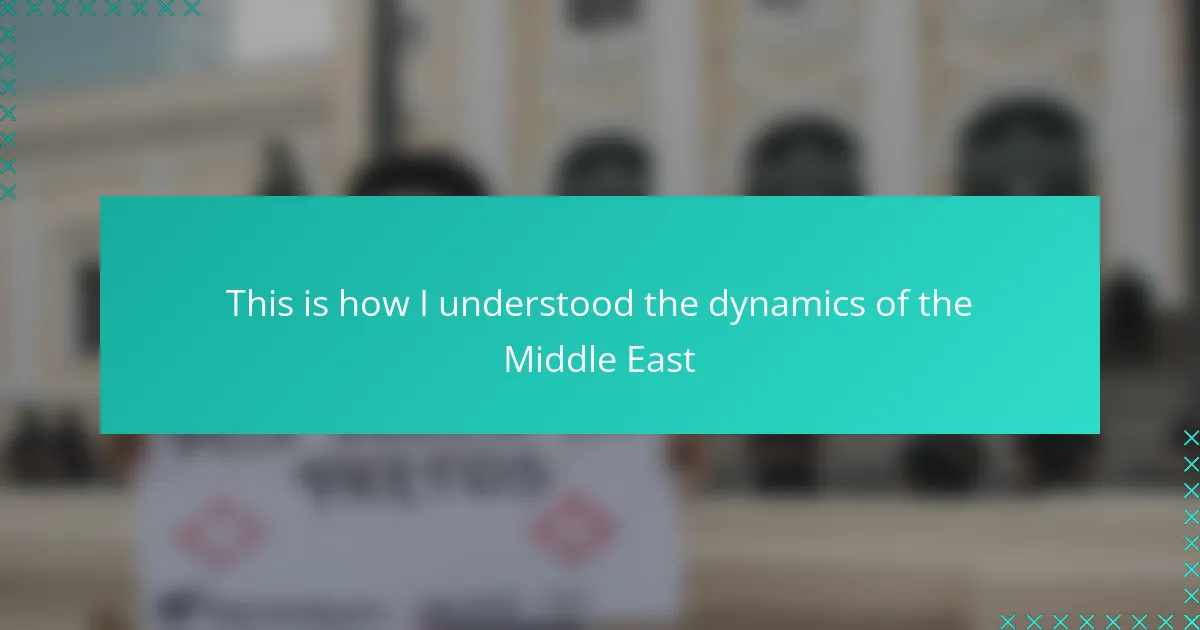Key takeaways
- Middle East geopolitics is complex, shaped by historical interventions, sectarian divisions, and local identities in relation to external powers.
- Key players like Saudi Arabia, Iran, Turkey, and Israel often experience shifting alliances influenced by both economic interests and historical rivalries.
- Global powers have a significant impact on regional dynamics, where their strategic interests can overshadow local needs, leading to proxy conflicts.
- Empathy and understanding of historical contexts are crucial for analyzing Middle East politics and could enhance global diplomatic efforts.
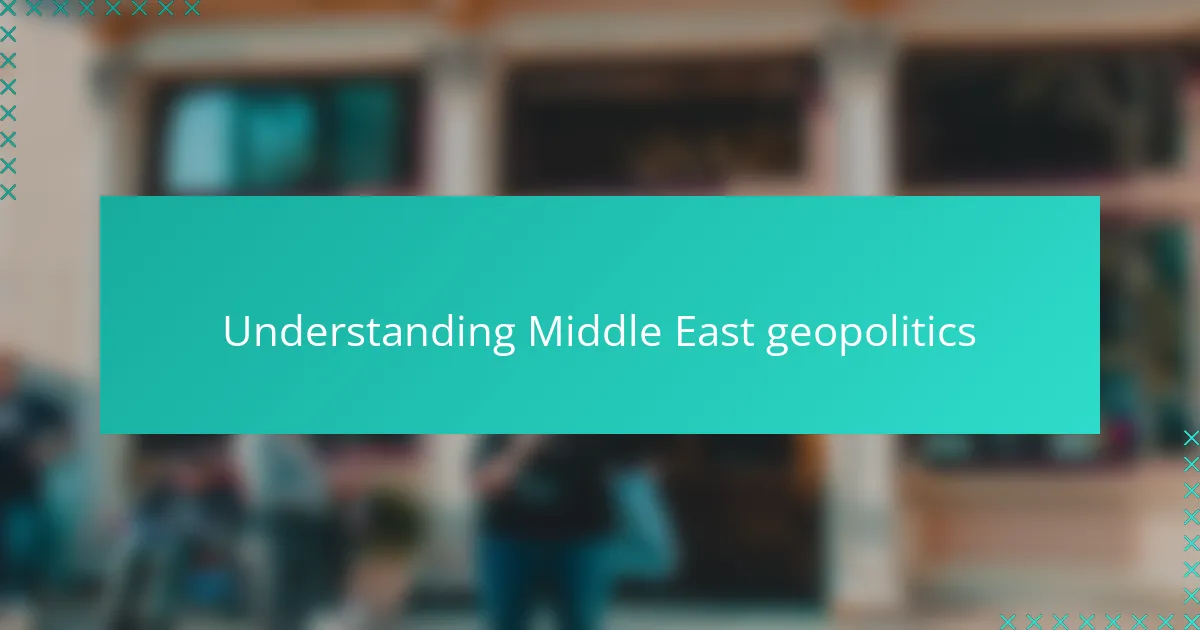
Understanding Middle East geopolitics
Grasping the complexities of Middle East geopolitics often feels like piecing together a puzzle where every piece is shaped by history, religion, and power struggles. I remember the first time I tried to understand why alliances seemed so fluid; it struck me how deeply intertwined local identities and external interests are. How can one make sense of a region so rich in culture yet fraught with tension?
From my experience, one crucial insight is realizing the role of external powers and their long-lasting influence. I often ask myself, what drives these nations to align with distant countries over their immediate neighbors? This question highlighted for me the weight of historical interventions and economic interests shaping political decisions.
Equally important is recognizing the impact of sectarian divisions and national ambitions, which are not always obvious at first glance. Observing these dynamics, I felt an emotional tug—understanding that behind geopolitical strategies lie real human hopes and frustrations. Isn’t it this human element that truly defines the region’s ongoing challenges and aspirations?
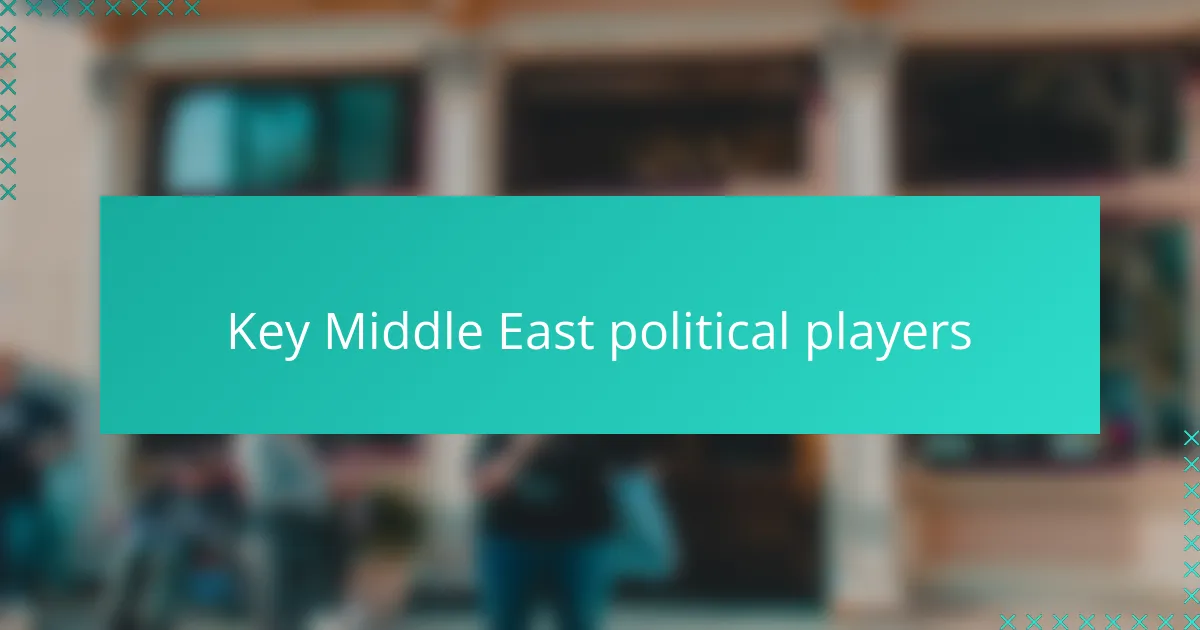
Key Middle East political players
When I think about the key political players in the Middle East, a few names immediately come to mind—Saudi Arabia, Iran, Turkey, and Israel. Each of these countries carries immense influence, but what fascinates me is how their goals often clash yet sometimes overlap in unexpected ways. Hasn’t it struck you as odd that rivalries can suddenly turn into strategic partnerships, even if only momentarily?
Saudi Arabia, with its vast oil wealth, often positions itself as the leader of the Sunni Muslim world, while Iran champions the Shia Muslims and pushes for regional dominance. Observing their prolonged rivalry made me realize it’s not just about religion; there’s a deeper power struggle tied to identity, ideology, and control. I wonder how often their people—caught in the middle—feel the weight of decisions made far above their heads.
Then there’s Israel, whose complex relationship with neighboring countries adds another intricate layer to the political chessboard. From my perspective, it’s impossible to understand Middle East geopolitics without considering how historical conflicts and security concerns drive Israel’s policies and alliances. Have you noticed how any shift involving Israel seems to send ripples across the entire region? This interplay between these key players is what truly shapes the political landscape.
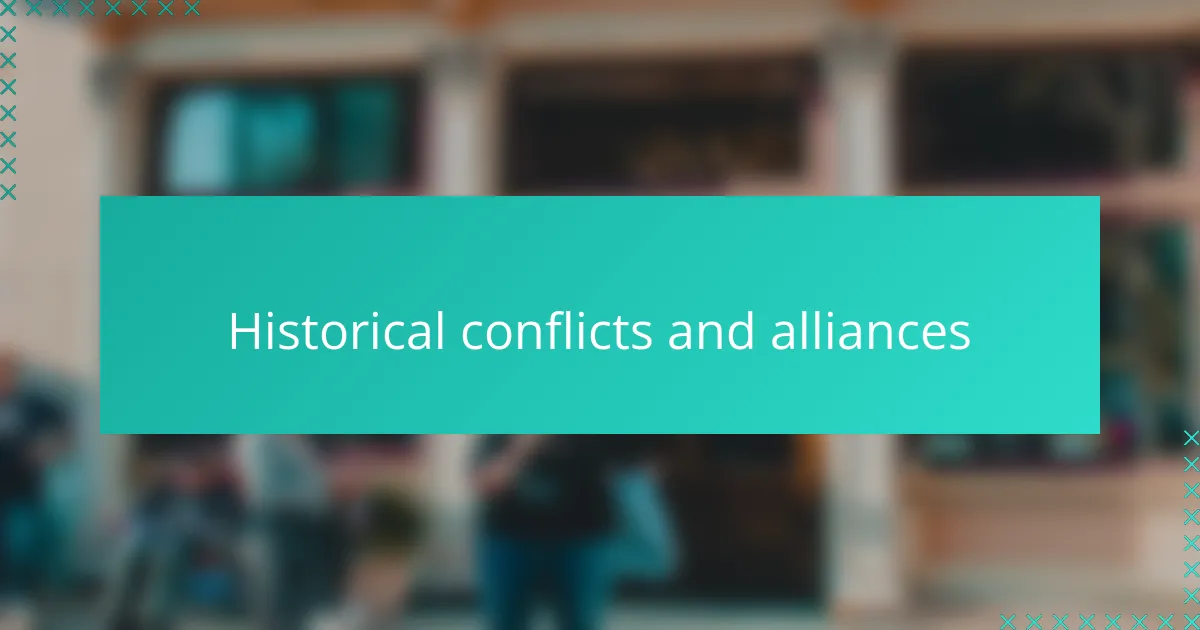
Historical conflicts and alliances
What fascinated me most while digging into the region’s history was how rivalries that seem eternal have often given way to surprising alliances. Take the shifting relationship between Egypt and Israel, for instance—once bitter enemies, they eventually signed a peace treaty that stunned the world. It made me realize that even the most entrenched conflicts can evolve when circumstances compel change.
But these alliances are never just about diplomacy; they’re woven tightly with older conflicts and tribal loyalties. I remember reading about how Ottoman-era rivalries still echo today, influencing modern borders and trust—or distrust—among neighbors. Doesn’t it make you wonder how much of today’s tensions stem from centuries-old grievances rather than immediate disagreements?
At the same time, regional powers have repeatedly aligned with external forces, like Britain and France during the colonial period, leaving a legacy that still shapes trust and suspicion. Reflecting on this, I felt how history’s weight isn’t just academic; it’s alive in every negotiation and conflict. Can we truly grasp current events without acknowledging these deep historical scars?
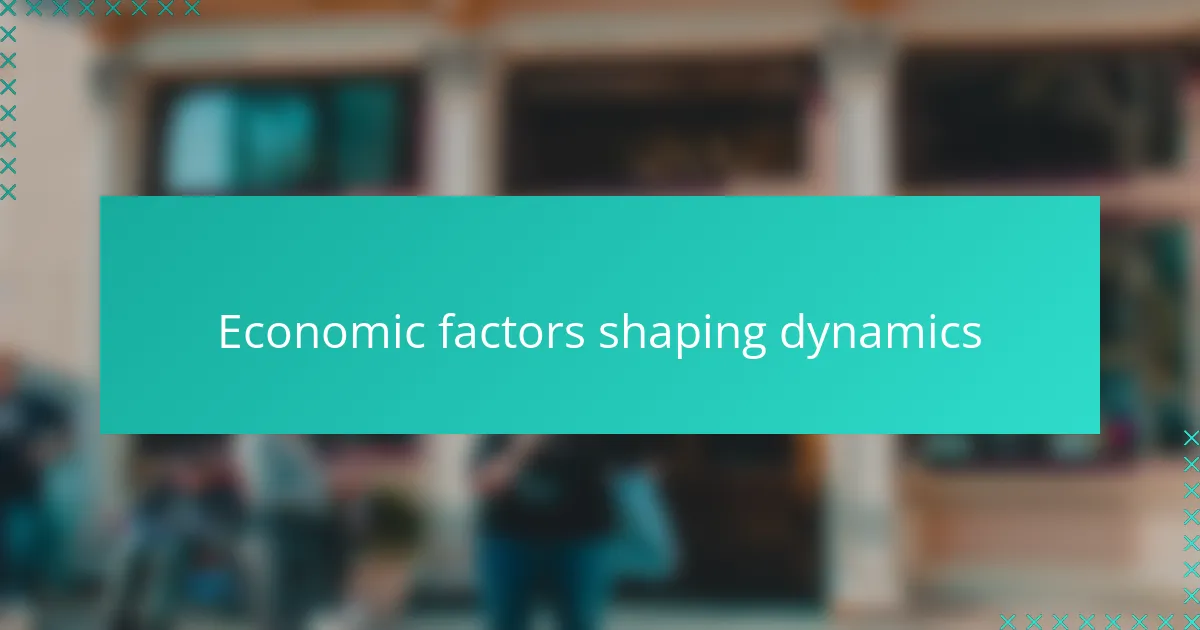
Economic factors shaping dynamics
Economic factors in the Middle East are, to me, like the unseen currents beneath a turbulent sea. Oil wealth, of course, dominates the picture, but I’ve learned it’s not just about abundance—it’s about how that wealth is distributed and leveraged. I often wonder how different the region’s dynamics would be if economic benefits reached everyone rather than concentrating in a few hands.
Another aspect that caught my attention is the reliance on hydrocarbon exports, which creates both power and vulnerability. Watching countries try to diversify their economies, I felt a sense of urgency—they know that global shifts toward green energy could upend their influence. Have you noticed how economic uncertainty often fuels political tensions, making alliances fragile and competition fierce?
Finally, economic aid and investment from external powers add yet another layer to the puzzle. I recall reading about how financial support can both stabilize and manipulate governments, leaving me to question: when does assistance become control? This delicate balance between economics and sovereignty shapes much of what happens behind the headlines in Middle East geopolitics.
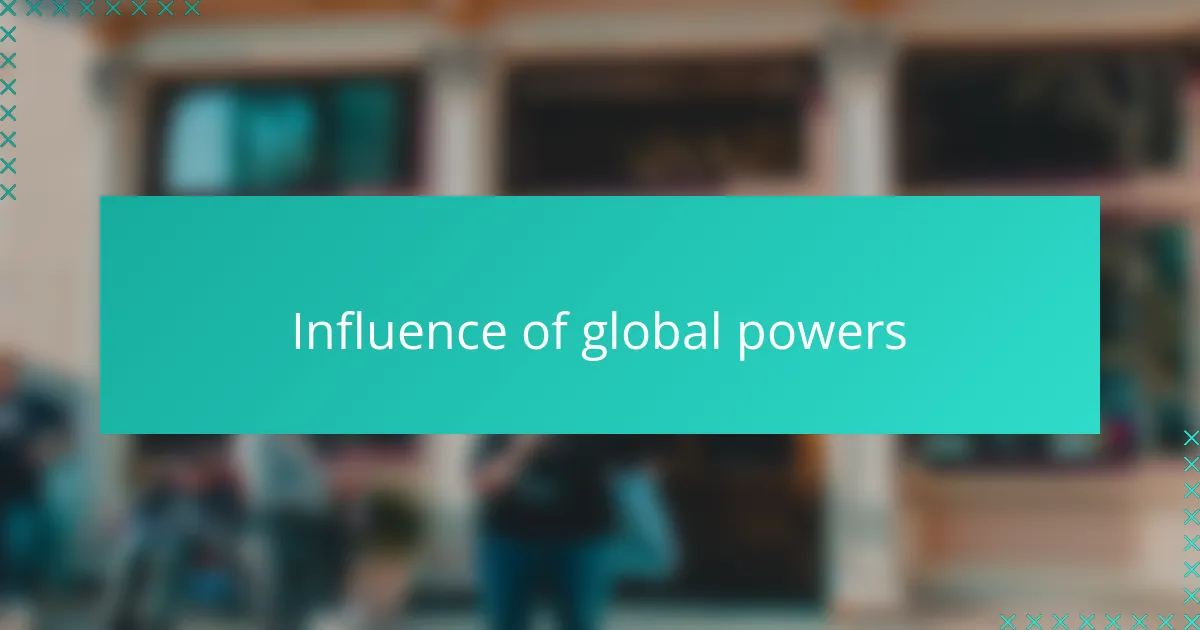
Influence of global powers
The influence of global powers in the Middle East is unmistakable, almost like an invisible hand guiding many of the region’s twists and turns. I remember being surprised at how Cold War rivalries once dictated alliances that seem so natural today, yet were born out of global ideological battles far from the desert sands. Isn’t it fascinating how decisions made in Washington or Moscow can ripple through countless lives thousands of miles away?
What struck me most is how the strategic interests of countries like the United States, Russia, and more recently China, often take precedence over local needs. I’ve seen how military aid, arms sales, and diplomatic backing can embolden some actors while isolating others, turning the Middle East into a stage for competition among these giants. Have you ever wondered if genuine peace can take root when external agendas constantly shift the balance of power?
From my perspective, these global interventions are a double-edged sword—they bring resources and attention but also fuel dependency and resentment. Reflecting on this, I felt a certain sadness recognizing that many local conflicts become proxy battlegrounds for bigger powers rather than opportunities for the region’s own people to shape their destiny. Could a change in this dynamic be the key to lasting stability?
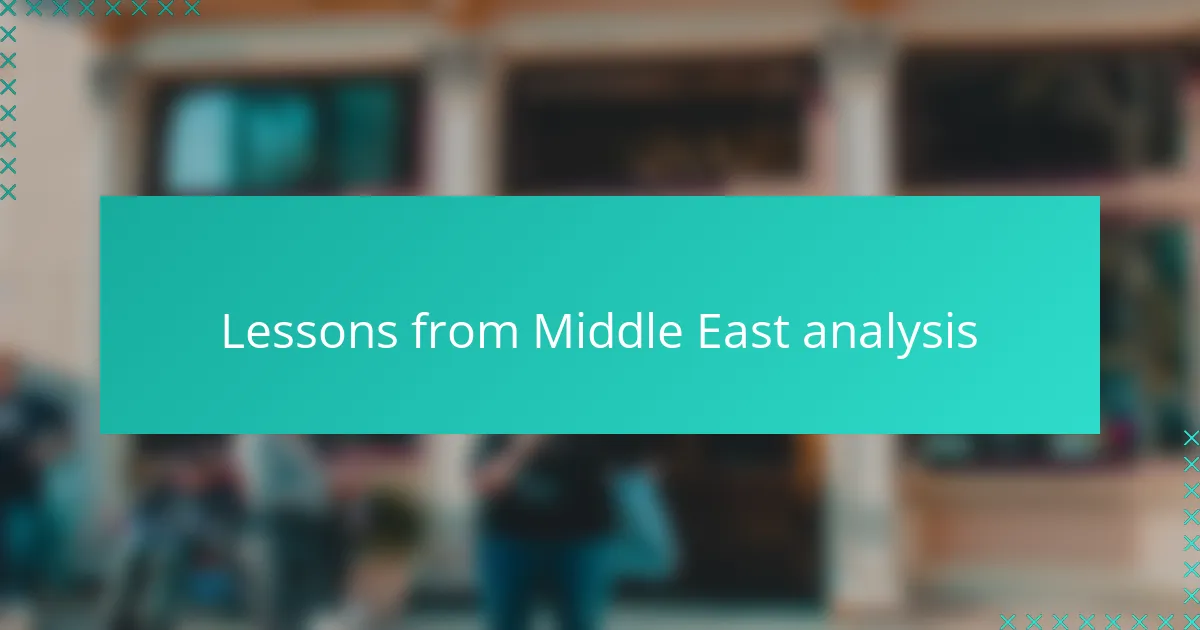
Lessons from Middle East analysis
One lesson I keep coming back to is how patience and context are essential when analyzing Middle East dynamics. Early on, I expected quick explanations, but I soon learned that understanding here demands deep dives into layers of history, culture, and shifting loyalties. Isn’t it humbling to realize how often surface events are only symptoms of much older stories?
Another insight is the power of narratives—both those told by local actors and by global players. I recall moments when watching news coverage made me aware that whose story gets amplified can change the entire perception of a conflict. It made me question: how much of what we “know” is shaped by voices with particular agendas, and how can we sift through that to find real truths?
Finally, I’ve found that empathy remains the most underrated tool in political analysis. Whenever I remind myself that behind every statistic or headline are people wrestling with fears, hopes, and survival, my perspective shifts. It’s a lesson I hold close—because without understanding the human heartbeat beneath the geopolitics, our analysis risks becoming cold and detached. Wouldn’t more empathy change how the world engages with this complex region?
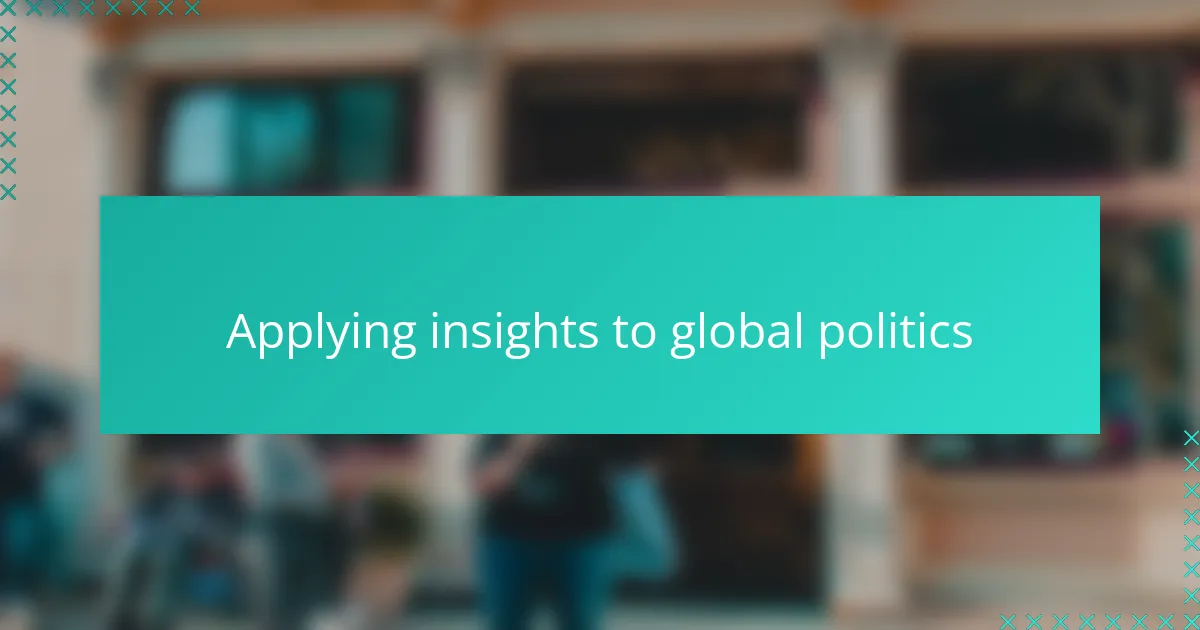
Applying insights to global politics
Applying insights from the Middle East to global politics, I realized how history’s long shadows shape not just one region, but international relations as a whole. When I consider broader geopolitical moves, I often wonder how often decisions made by global powers are influenced more by legacy interests than present realities. Doesn’t that give you pause about the motivations behind foreign policies beyond immediate headlines?
I also see economic factors in the Middle East as a reminder that resource wealth is a double-edged sword globally. Watching how countries there struggle to balance external investments with sovereignty made me reflect on similar patterns everywhere—how financial aid or sanctions can sometimes deepen conflicts rather than resolve them. Have you noticed how economic dependencies often complicate diplomacy in other parts of the world too?
Most importantly, the human element in Middle East politics convinced me that empathy isn’t just a moral choice but a strategic necessity in global analysis. I often ask myself if policymakers worldwide pause enough to understand the lived experiences behind political actions. Maybe, if more leaders embraced this perspective, international relations would move beyond zero-sum games toward more sustainable, inclusive solutions.
